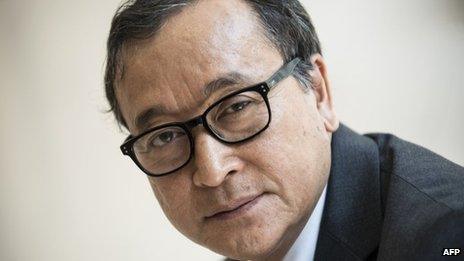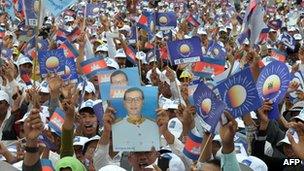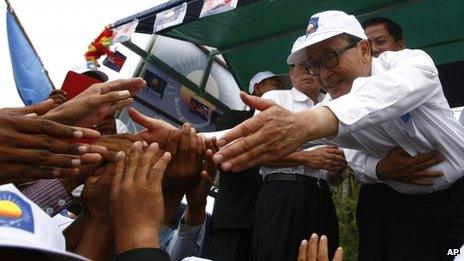Profile: Sam Rainsy
- Published

Sam Rainsy has been a thorn in Hun Sen's side for many years
Sam Rainsy is Cambodia's opposition leader, a charismatic figure whose tussles with the government have seen him exiled and then pardoned.
A long-term rival to Prime Minister Hun Sen, he was sentenced in absentia to 11 years in prison in 2010 on a series of charges he says were politically motivated.
Mr Rainsy, 64, lived in self-imposed exile in France, but was in July 2013 granted a royal pardon, returning to Cambodia shortly before the 28 July elections.
"Anything can happen in Cambodia," he told the BBC on 17 July. "I have escaped many assassination attempts. Then the government has tried to eliminate me from the political scene."
"But there is pressure - internal pressure and external pressure - to allow me to come back," he said. "I will use my freedom to fight for the freedom of my people."
But he remains unable to stand in the polls and while his presence is expected to boost the opposition, analysts still heavily favour Hun Sen's Cambodian People's Party (CPP) to win.

Mr Rainsy's presence is expected to boost the opposition in the 2013 polls
Political career
Mr Rainsy, who currently holds a French passport, was born in Phnom Penh in 1949. He left Cambodia for France in 1965 at the age of 16, after his politician father - believed to have been killed by government agents - disappeared.
In France, he studied and worked as a banker before establishing his own accounting firm.
He began his political career in Cambodia with Prince Norodom Ranariddh's Funcinpec party, becoming a European representative of the prince in 1989.
He returned to Cambodia and became finance minister in 1993 after Funcinpec's success in the elections - the same year Hun Sen forced negotiations to become co-prime minister with the prince.
But in 1994 he was expelled from the party following a vote of no-confidence against him. He was stripped of his seat in parliament and a year later founded his own party, the Khmer Nation Party.
In 1997, he nearly fell victim to a grenade attack during a political rally outside the National Assembly, which killed at least 16 of his supporters.
He blamed the attack on supporters of Hun Sen, whom he claimed was determined to "seize absolute power by any means".
Before the 1998 elections, the Khmer Nation Party changed its name to the Sam Rainsy Party. But the newly-named party only won 14% of the vote, corresponding to just 15 seats in government.

Mr Rainsy was granted a royal pardon before the 28 July elections
In the 2003 poll, the SRP did better, coming second behind Hun Sen's CPP, with 22% of the votes.
Since a two-thirds majority was needed to form a governing coalition, Hun Sen's CPP eventually struck a deal with Funcincpec in 2004.
This led SRP lawmakers to initially boycott the new National Assembly, claiming the other two parties violated constitutional procedures in forming the new government.
In the 2008 elections, SRP won 26 parliamentary seats. The next year, however, Mr Rainsy left Cambodia before he was jailed on charges that included publishing a false map of the border with Vietnam and insulting a former foreign minister.
Ahead of the 2013 polls, Hun Sen faced calls from the US to allow him to return - and a royal pardon was subsequently granted.
SRP has now formed an alliance with the Human Rights Party to establish the Cambodian National Rescue Party, which is contesting the polls.
"The popular support is unprecedented so this is the basis for the victory of the opposition, for the democratic opposition," Mr Rainsy said during a political rally after his return in July.
Analysts still predict the CPP will dominate the polls. But Mr Rainsy is seen as a rallying presence for the increasingly vibrant opposition.